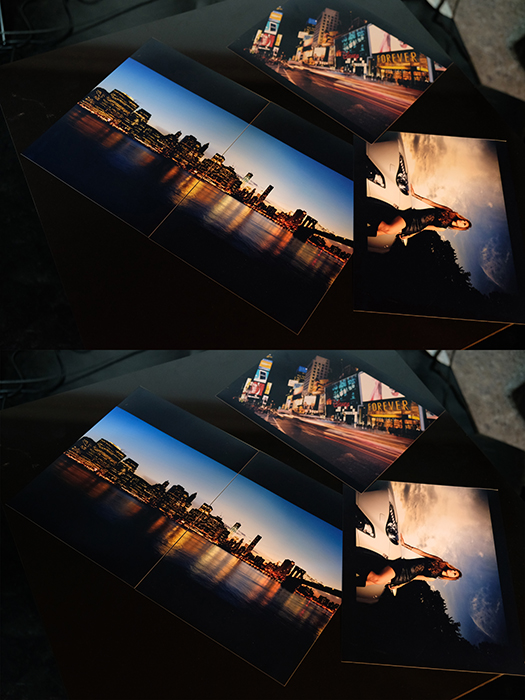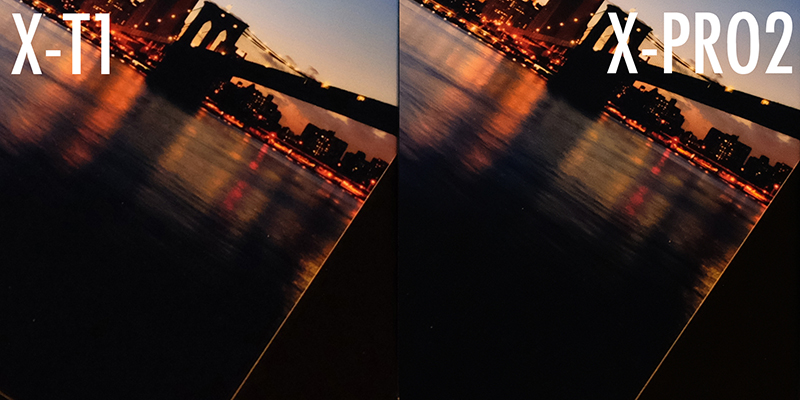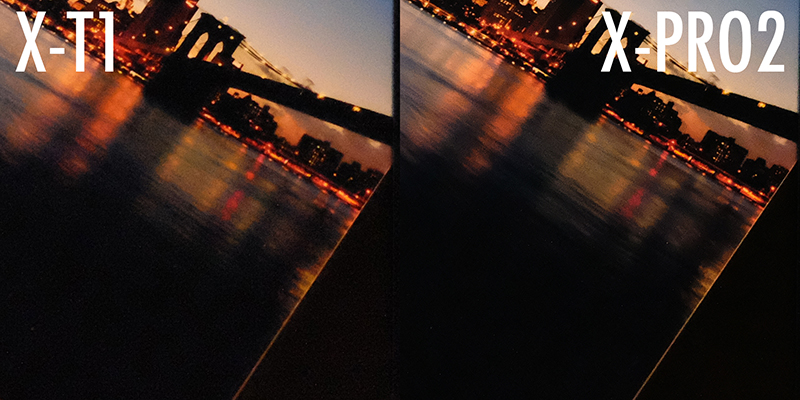Fujifilm X-T1 vs X-Pro2: Which Camera Should You Buy?
![]()
I personally own the Fujifilm X-T10, but I became curious recently: is the new X-Pro2 worth the upgrade, or is the X-T1 enough of an upgrade from the X-T10?
I wanted to make the tests as fair as possible so I shot almost all of them inside my studio, as the lighting and conditions don’t change. All shots were taken using same lens, the Fuji 18-55mm f/2.8-4.
Side By Side
Below is a side by side comparison of the two cameras. For me, the X-Pro2 feels more sturdy, it’s like I’m holding a small version of a full frame pro DSLR. And I think it really is a dust-proof, splash-proof and freeze-proof body, just by the feel of it — it feels like a tank.
![]()
![]()
The menu of the X-Pro2 is also different and more organized.
On the quick menu, you can also go to down/up to -4 to +4 on the highlights, shadows, colors, and contrast. You can only go down/up to -2 to +2 on the X-T1. I find this very useful if you want to do all things in-camera.
![]()
Dual SD slots on the X-Pro2.
![]()
The X-T1 has the flash sync port on the front, and X-Pro2 on the side.
![]()
Also different dials on both of the cameras as the X-Pro2 is a rangefinder type camera, and the X-T1 is a DSLR type.
![]()
![]()
![]()
If you’re not used to the X-Pro, you need to adjust a bit to the ISO dial but you get used to it after some time.
![]()
The ISO Dial of the X-T1 is on the left side.![]()
There’s an added Focus Level for the X-Pro2 where you can move the joystick in eight directions (which I didn’t use for some reason).
![]()
![]()
The Hybrid Multi Viewfinder with Electronic Rangefinder on the X-Pro2.
![]()
![]()
![]()
The tilt screen on the X-T1, which I find very useful.
![]()
Focusing and Speed
The speed of the X-Pro2 is faster than the X-T1, from turning it on to how fast the viewfinder refreshed after clicking the shutter.
![]()
![]()
I tried the focusing speed and accuracy on both of the cameras.
The first test was focusing the lens to infinity and using AF-S single point focusing on one part of the watch. The watch was well-lit with a soft box and reflectors placed near the subject.
![]()
Both camera focused quickly without any problem and almost the same time, with the X-Pro2 about .10 to .20 seconds faster.![]()
Shot with the same settings on both of the camera and straight JPG. WB: Kelvin 5600, Classic Chrome, Sharpness +1, Highlights +2. 1/160, ISO 200, f4
![]()
![]()
I also wanted to try focusing on a back-lit subject, so I placed 3 studio strobes pointing at the white seamless paper, and placed a 300 watts flood light pointing directly at the subject.
![]()
![]()
Both cameras had a hard time focusing when I placed the focus point on the battery’s logo, so I adjusted the focusing point on the rim light on the battery and both cameras got it.
![]()
Even with the same settings, the X-Pro2 showed more details on the battery.
![]()
The next test was extremely hard because only a very small amount of light was hitting the subject, the X-Pro2 got the focus almost half of the time and the X-T1 got none.
![]()
![]()
I also tried a quick outdoor test shot. Focusing was AF-C + Zone on both cameras. The X-Pro2 got 4/5 in focus while the X-T1 got 3/5 in focus.
![]()
Burst Mode High and Outdoor High Speed Photography Test
To test the burst mode of both cameras I did a high-speed photography test with milk splashes. Both cameras are 8 FPS on Continuous High.
![]()
![]()
Both settings of the camera were the same. WB: Auto, Velvia, Sharpness +1. 1/4000, ISO 1600, f/4
![]()
![]()
![]()

Color Test
To test the colors on both cameras I used the X-Rite ColorChecker.
![]()
![]()
Same settings on both of the camera. WB: Auto, Provia, 1/160, f8, ISO 200
It’s really hard to tell the difference between the two.
![]()
![]()
ISO Test
Using only ambient light on the ISO test. I couldn’t find any difference until it went to about ISO 1600, and the X-Pro2 just amazed me when it went to up to 25,600 which is still very usable.













Extra ISO settings on the X-Pro2, iso 8,000 and ISO 10,000
![]()




RAW Test
For the raw test, I shot about 5 stops under exposed on both cameras and brought the exposure back using camera raw.
![]()
![]()
Both cameras did pretty excellent getting those details back.
![]()
![]()
Portrait and Product Test
Shot with the same settings on both of the camera and straight JPG. WB: Kelvin 5600, Classic Chrome, Sharpness +1, Highlights +2. 1/160, ISO 200, f4.
![]()
The colors on the fuji X-Pro2 seems more vibrant. And when zoomed in about 1200px there is more detail in the X-Pro2, maybe because of the higher megapixel count.
![]()
![]()
Settings for both cameras were. WB: Auto, Provia, 1/8, ISO 200, f/5.6
![]()
![]()
Settings for the Portrait test were WB: Auto, Provia, 1/160, ISO 200, f/8
I got a big mama on the back of the subject (the girlfriend), and a softbox above her. Also placed a reflector below her for fill.
The results were the same as the watch, the X-Pro2 having more vibrant colors and more contrast against the X-T1.
![]()
![]()
![]()
![]()
![]()
This is how big the 24.3 Megapixel of the X-Pro2 is compared to the 16.3 Megapixel on the X-T1.
![]()
Conclusion
First of all, the X-Pro2 is the flagship camera of Fujifilm and is also newer than the X-T1.
At first when I was only using the LCDs of the cameras, I had a hard time looking at the difference between the image quality of both. After transferring it to my computer and putting the images side by side, however, the X-Pro2 seems more vibrant than the X-T1 straight of the camera. For me, it is also faster and built sturdier than the X-T1.
If you are still using the original X-Pro, then no doubt go straight to the X-Pro2. But if you are using a different camera, then it’s quite a tough choice (with rumors of an X-T2 on the horizon, the choice is even harder).
If you are the rangefinder type of photographer, need a higher megapixel, or want to shoot at a really high ISO, go for the X-Pro2. But if you’re not, then the X-T1 or even the X-T10 (same sensor as the X-T1) would do the job, and you can use your remaining money for lenses.
In the end, both are excellent cameras.
I would like to thank Fujifilm Tokyo Headquarters and Fujifilm Philippines, especially Glenn Gatan for assisting me with the X-Pro2. I would also like to thank Doc Ian DV Photography for lending me his X-T1 for this test.